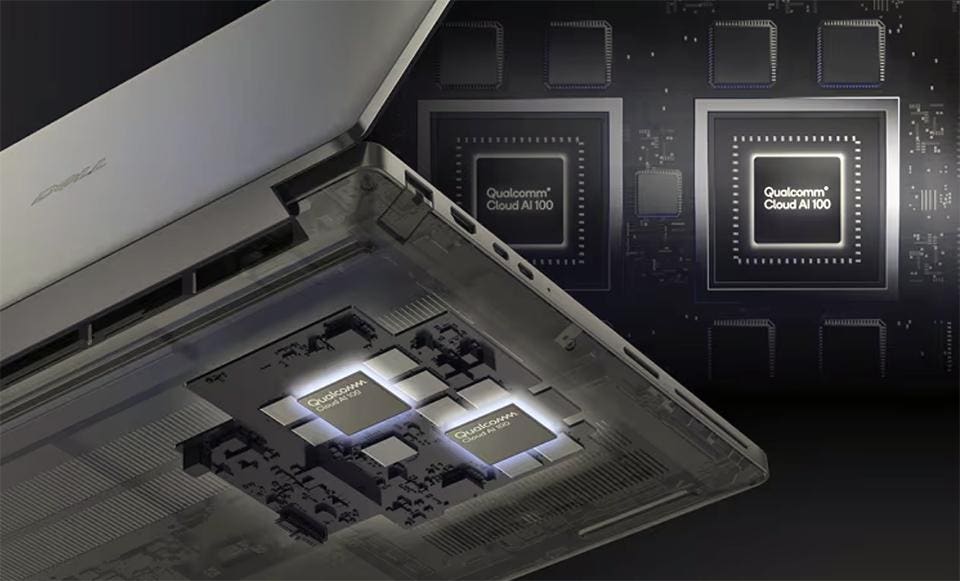Qualcomm Cloud AI 100 Accelerators In The Dell Pro Max Plus.
Dell
At Dell Technologies World 2025 in Las Vegas earlier this month, as you might expect in this day and age, many of the announcements and releases revolved around AI and AI-driven solutions. The day one and two keynote speeches from Michael Dell and Jeff Clarke, both specifically highlighted advancements in AI, from the cloud to the edge, along with AI factories and modern workplace solutions. As a long-time accelerated computing enthusiast, I thought one particular announcement, regarding an upcoming Dell Pro Max Plus mobile workstation, flew a bit under the radar.
Dell Pro Max Plus Emerges As A Powerful Mobile Workstations For AI Engineers
The Dell Pro Max Plus is a premium 18” desktop-replacement class laptop designed specifically with AI engineers and data scientists in mind. In fact, it is the first machine of its kind to feature not one, but two enterprise-grade discrete NPUs, namely the Qualcomm AI 100. Each AI 100 features 16 of Qualcomm’s 7th-gen AI cores with 144 MB of on-chip memory, and each is capable of delivering up to 400 Int8 TOPs and 200 FP16 TOPs of compute performance. Each AI 100 is also paired to 32GB of LPDDR4X memory (64GB in total) offering up to 136GB/s of peak bandwidth, but the entire complement of AI compute resources and memory are presented to the system as a single resource pool.
The Qualcomm Cloud AI 100 Accelerators In The Dell Pro Max Plus Reside On An Add-In Card.
Dell
Qualcomm’s AI 100 accelerators in the Dell Pro Max Plus are integrated on a custom PCB, that is attached via PCI Express, and installed in the laptop where a discrete GPU would normally reside. Incorporating the discrete AI accelerators with a relatively large memory capacity in this way allows the system to handle large AI models locally, without relying on the cloud, that are simply too much for most on-processor NPUs and discrete GPUs. This is a key differentiator for the Dell Pro Max Plus; the ability to process AI workloads directly on the device enhances security, reduces latency, and ultimately gives users greater control over their proprietary data.
Using Discrete AI Accelerators Is Not Without Its Limitations
Dell’s decision to integrate a discrete AI accelerator card rather than a GPU does have some drawbacks, however. While the Qualcomm AI 100s with 64GB of memory will be capable of running models that are simply too large to fit in the 24GB of memory available in even NVIDIA’s current, most powerful laptop GPU, the NVIDIA RTX PRO 5000 Blackwell Generation, these Qualcomm chips don’t handle any graphics processing or 3D rendering. That will obviously limit gaming on the system (which likely isn’t a concern for the users targeted by the Dell Pro Max Plus), but it will also hinder some creator and pro-vis workloads as a result. The Dell Pro Max Plus is built around Intel’s most powerful Core Ultra 200HX series processors and offers up to 96GB of system memory, so it’ll have plenty of CPU horsepower and a relatively capable integrated GPU with a modern media engine, but neither can make up for the lack of a discrete GPU in some workloads.
The Dell Pro Max Plus With Dual Qualcomm AI 100 Accelerators.
Dell
There are also products built around AMD’s “Strix Halo” Ryzen AI Max series of processors to consider. Strix Halo has a somewhat unique design that combines up to 16 CPU cores with a powerful GPU, connected to system memory over a 256-bit wide memory interface. In a system with 128GB of memory, the GPU in the Ryzen AI Max series can access up to 96GB of memory, which would technically allow it to process even larger models than the pair of AI 100s in the Dell Pro Max Plus, but without as much compute muscle.
All that said, the upcoming Dell Pro Max Plus with Qualcomm AI 100s still represents an interesting value proposition for AI engineers and data scientists that can benefit from a mobile form factor. The AI PC landscape is still taking shape, but there’s no denying it’s here to stay and the need for AI compute resources isn’t going away anytime soon. It’s great to see Dell taking a chance on an innovative solution and I suspect the Dell Pro Max Plus has many potential users intrigued.
